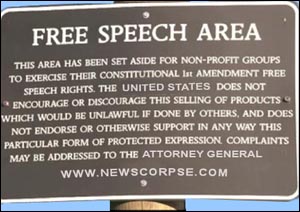Don't regulate banking – liberalise itBarack Obama's speech on Monday to Wall Street outlines an overhaul of the regulatory regime. On the anniversary of the bankruptcy of Lehman Brothers,
politicians from both sides of the Atlantic are looking to remodel
capitalism. The thirst for greater regulation is strong, united around
Gordon Brown's judgment
that "laissez-faire has had its day … the old idea that the markets
were efficient and could work themselves out by themselves are gone".The
notion that the present financial system is "laissez-faire" is, of
course, ludicrous. At present, we have a nationalised organisation that
holds a state-granted monopoly on the issuance of currency. If this
were any industry other than finance, the Bank of England would be seen
as the Soviet-style planning board that it is.
Complete and utter sense? I'm shocked, go read the whole thing, it is only short. Almost as much fun as reading the brainwashed commentators who believe big state owned-run everything is the only solution. Fucking pussies.
Maybe Mr Evans took a look at the Libertarian Party manifesto...















3 comments:
The Bank of England creates very little money these days. The 'system' operates slightly differently to that of America. It's private, commercial, banks that do the money creation. They do so irrespective of the effect that inflating the money supply, out of proportion to any growth in goods or services, has on the economy.
it's far from certain that the Bank of England is 'nationalised' either. What role it's subsidiary, the Bank of England Nominees, has is unclear to say the least. Unsurprisingly it is protected by being a Royal Charter company so you can't even ask questions about it in Parliament. Whatever the case regarding ownership, one look at the Board of Directors confirms that if not in the control of banking interests it operates to their benefit.
The idea that the 'government' has been in charge of monetary policy is risible. It's wholly owned and controlled by the same elites that control the banks.
If you're interested I've written an essay on the subject called the Great Banking Swindle. Here are a few quotes I used.
Nobel Laureate Dr. Frederick Soddy wrote: “The ‘money power’ which has been able to overshadow ostensibly responsible government is not the power of the merely ultra-rich but is nothing more or less than a new technique to destroy money by adding and withdrawing figures in bank ledgers, without the slightest concern for the interests of the community or the real role money ought to perform therein…to allow it to become a source of revenue to private issuer's is to create, first, a secret and illicit arm of government and, last, a rival power strong enough to ultimately overthrow all other forms of government. An honest money system is the only alternative."
The words of economist William Lyon Mackenzie King, who later went on to become Canada’s longest serving Prime Minister, are also quite pertinent. He said: "Once a nation parts with the control of its currency and credit, it matters not who makes the nations laws. Usury, once in control, will wreck any nation. Until the control of the issue of currency and credit is restored to government and recognised as its most sacred responsibility, all talk of the sovereignty of parliament and of democracy is idle and futile."
Our current predicament is summed up by another former American President, Benjamin Franklin, when he wrote in his biography: "… creating ourselves our own paper money, we control its purchasing power and we have no interest to pay to no one. You see, a legitimate government can both spend and lend money into circulation, while banks can only lend significant amounts of their promissory bank notes, for they can neither give away nor spend but a tiny fraction of the money the people need. Thus, when your bankers here in England place money in circulation, there is always a debt principal to be returned and usury to be paid. The result is that you have always too little credit in circulation to give the workers full employment. You do not have too many workers, you have too little money in circulation, and that which circulates, all bears the endless burden of unpayable debt and usury."
This brings to mind a quote from the monetary theorist E. C. Reigel. He said: "Throughout the ages, the devices of cunning men have turned money to their nefarious purposes. Money, beginning with private enterprise as a means of escaping the limitation of barter, soon developed the cheat to exploit the honest trader who, in an effort to protect himself, turned to government for protection, only to find that now he had two thieves, the private money changer and the political plunderer working hand in glove against him. By this combination the money changer gained the prestige of political sanction through legislative license and the state secured a deceptive device for laying taxes upon the citizenry (by means of the hidden tax called inflation). It was and remains a vicious alliance."
The right to create currency should reside with the people. In ideal world that would be their representative government. At present we have government that represents the interests of others. We not only need a new banking system but an accountable system of government as well.
Great E.C. Reigal quote.
I agree with what you say. When you mean private banking houses I'm assuming through the fractional system.
Got a few quotes of my own to add to this actually.
"Banking was conceived in iniquity and was born in sin. The Bankers own the Earth. Take it away from them, but leave them the power to create deposits, and with the flick of the pen they will create enough deposits to buy it back again. However, take it away from them, and all the great fortunes like mine will disappear, and they ought to disappear, for this would be a happier and better world to live in. But if you wish to remain the slaves of Bankers and pay the cost of your own slavery, let them continue to create deposits." - Sir Josiah Stamp, President of the Bank of England in the 1920's, the second richest man in Britain
"When a government is dependent upon bankers for money, they and not the leaders of the government control the situation, since the hand that gives is above the hand that takes... Money has no motherland; financiers are without patriotism and without decency; their sole object is gain." -- Napoleon Bonaparte, 1815
It was the Rothschild banking family that funded both sides of the Napoleonic wars, I might add.
Post a Comment